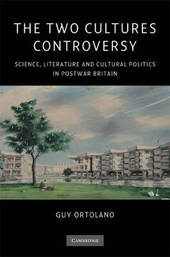
|
The Two Cultures Controversy: Science, Literature and Cultural Politics in Postwar Britain
Hardback
Main Details
| Title |
The Two Cultures Controversy: Science, Literature and Cultural Politics in Postwar Britain
|
| Authors and Contributors |
By (author) Guy Ortolano
|
| Physical Properties |
| Format:Hardback | | Pages:308 | | Dimensions(mm): Height 235,Width 160 |
|
| Category/Genre | British and Irish History |
|---|
| ISBN/Barcode |
9780521892049
|
| Classifications | Dewey:941.0855 |
|---|
| Audience | | Professional & Vocational | |
|---|
|
Publishing Details |
| Publisher |
Cambridge University Press
|
| Imprint |
Cambridge University Press
|
| Publication Date |
8 January 2009 |
| Publication Country |
United Kingdom
|
Description
Ever since the scientist-turned-novelist C. P. Snow clashed with literary critic F. R. Leavis in the early 1960s, it has been a commonplace to lament that intellectual life is divided between 'two cultures', the arts and sciences. Yet why did a topic that had long been discussed inspire such ferocious controversy at this particular moment? This book answers that question by recasting this dispute as an ideological conflict between competing visions of Britain's past, present, and future. It then connects the controversy to simultaneous arguments about the mission of the university, the methodology of social history, the reasons for 'national decline', and the fate of the former empire. By excavating the political stakes of the 'two cultures' controversy, this book explains the workings of cultural politics during the 1960s more generally, while also revising the meaning of a term that continues to be evoked to this day.
Author Biography
Guy Ortolano is Assistant Professor at the University of Virginia.
ReviewsReview of the hardback: 'The Two Cultures Controversy provides a full and persuasive account of Snow's public roles during his years of fame and a thoughtful exploration of the ramifications of the debate surrounding his celebrated lecture. On these grounds, it will be of considerable value to cultural, educational and political historians of the period, as well as of interest to a wider readership curious about the origins and continuing significance of a famous phrase.' Stefan Collini, Twentieth Century British History Review of the hardback: 'This is an exceptionally thoughtful and thought-provoking work from which (truly) every modern British historian will learn something fresh and useful.' Peter Mandler, H-Net Review of the hardback: 'An excellent piece of work ... Ortolano gives us [a] widescreen, wrap-around cultural history of postwar Britain.' John Toye, Economic History Review Review of the hardback: 'Guy Ortolano has provided us with a detailed and insightful study ... [He] shows ... how we can use the Two Cultures to understand the wider ideological and social currents to which it was intimately related: liberalism, declinism, meritocracy, and technocracy.' Waqar Zaidi, Journal of British Studies Review of the hardback: 'As I read further and further into this text, I could ever more readily hear and feel, even smell, a Britain now largely gone. ... Ortolano has captured an important lost moment - even a last moment - in the rise and fall of a Britain dominated by a narrow educational and social ruling stratum.' David Coates, American Historical Review Review of the hardback: '... a very important work on a key topic of twentieth-century British history. ... [Ortolano] has given an excellent foundation on which further studies can be based.' British Journal for the History of Science Review of the hardback: 'Ortolano has brought [Snow and Leavis] splendidly back to life ... At the same time, thoroughly and imaginatively discussed here, the debate and its ramifications raise issues important for Britain and elsewhere for the second half of the 20th century and beyond. Highly recommended.' Peter Stansky, Choice Review of the hardback: 'Ortolano provides a detailed and illuminating history of the controversy ... This is a highly readable and informative study.' Mary Jo Nye, Isis Review of the hardback: 'In this deeply researched and closely argued book, Guy Ortolano ... helps explain why what began as a rather modest Cambridge lecture became the focus of some of the sharpest and most significant debates of the postwar era.' Bruce J. Hunt, British Scholar
|